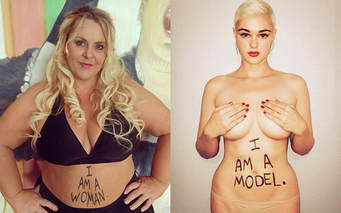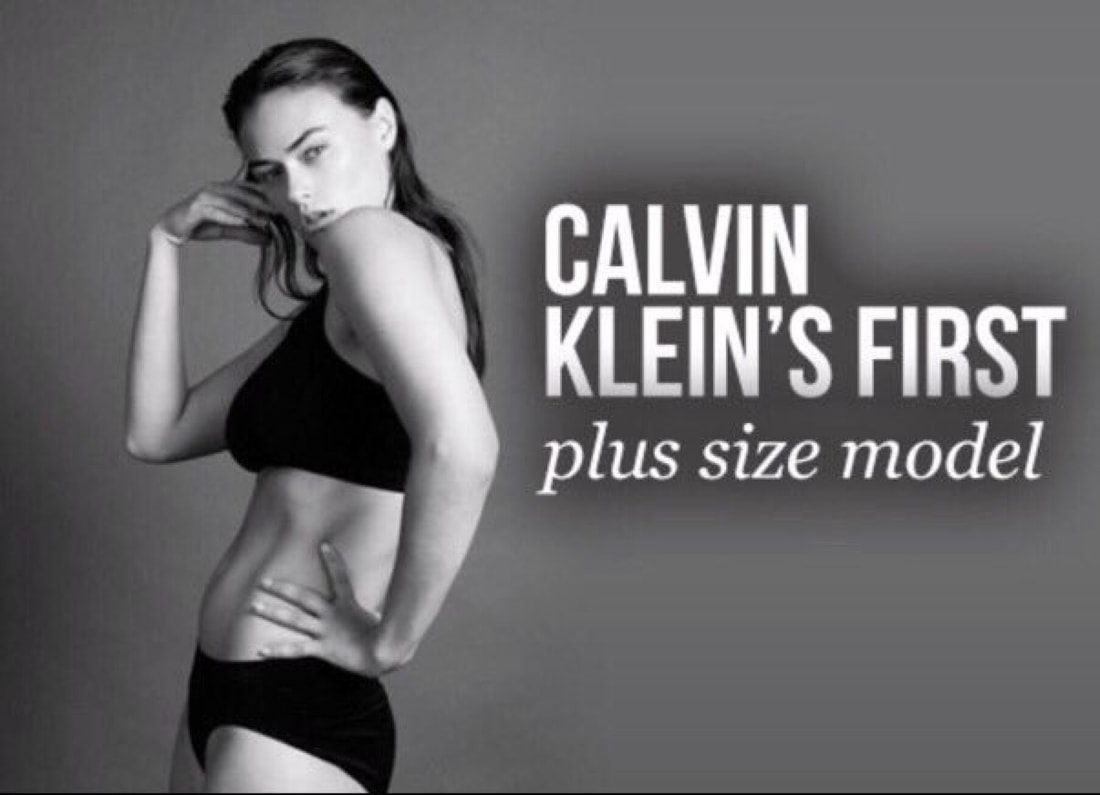“It’s not that we don’t want to talk about it, it’s that every skinny f*** is too afraid to say anything.” @deleteduser said, followed by another Tweet: “Plus size people aren’t any better, we don’t say anything, and just keep getting shot down about our size.”
- Molly Hickey

The media has a way of portraying people for how they look, not who they are. This could mean many things, most importantly as it speaks to issues around body image for larger people. Many people have developed a perspective on plus-size women that is referred to as the “male gaze” (the thought that all women should have a certain shape, or weight). Of course, not all men perceive women like this, but it’s derived from the lust men had/have for women, and the idea of what the perfect woman should look like. This idea that men want a nice ass, big breasts, and a small waist is troubling, as most women do not fit into this description. The male gaze and its effect on plus-sized women’s body image makes it hard to be larger than a size eight in our society.
In 2012 a study documented that 160 million people in america are either overweight or obese, but people have developed a new phrase for people who aren’t skinny, and only a bit overweight, yet not fat or obese: “thic.” This word is supposed to be a compliment, but has become far from it in the eyes of plus size people because if someone is not “thic” and not skinny, they automatically are classified as fat, ugly—someone no one would want, someone they don’t want to be.
Sixty-percent of American women are overweight, including people classified as “thic.” It’s been psychologically proven that it is mentally less stressful to be an obese adult, than to be an obese teen. This is because the adult brain is fully developed, and the teen brain is intensely hormonal. One third of all teens are obese—including boys. Teens are more affected by the repercussions of obesity because of the effects that their everyday life has on them: social media, peer pressure, etc.
Many businesses today have begun to add more and more plus size models, or workers to their industries. Maybe this is because they are open to size diversity, but most likely the pressure society has put them under to be more open to branching out, size wise. This is why we see so many “plus size” models when shopping online; we see bigger women laughing and smiling in bikinis that are too small, or too revealing, just so businesses can be credited for having a “open mind.” However, the women in these photos are not what most obese people would classify as “fat” or obese, it’s what they would classify as “thic” Some would even say “not even plus size, they’re just a tiny bit bigger than skinny.”
These issues are not talked about, not written about because people are not prepared to talk about the real problem—people do not like plus size people, but they don’t want to admit it. An anonymous account on Twitter recently posted, “It’s not that we don’t want to talk about it, it’s that every skinny f*** is too afraid to say anything.” @deleteduser said, followed by another Tweet: “Plus size people aren’t any better, we don’t say anything, and just keep getting shot down about our size.” And it’s true, not one person has been so devoted to this issue. Sure people write articles, and make speeches, but the only result is more “plus size” models.
What is anyone doing about the teens? The teens who have been destroying themselves because of how they look? The ones developing eating disorders because society has shamed them for looking different, looking bigger? Who is doing something?
Or maybe the bigger question is what can we do? No one can stop verbal harassment online, or in schools at lunch. No one can change every single teens point of view. This “perfect” image has been implanted into every community, and it’s destroying lives of young people. Some teens come to accept this kind of thing, but most hide behind a smile, and pretending they don’t care. Teens shouldn’t have to pretend they don’t care about how they look because society says they shouldn’t. All teens care about how they look; consciously or subconsciously, it’s the way their brains are programed. Just because a teen is obese, shouldn’t mean they can’t act like a normal teen. It’s really not a question of why so many teens are obese, but why it’s such a social problem
In 2012 a study documented that 160 million people in america are either overweight or obese, but people have developed a new phrase for people who aren’t skinny, and only a bit overweight, yet not fat or obese: “thic.” This word is supposed to be a compliment, but has become far from it in the eyes of plus size people because if someone is not “thic” and not skinny, they automatically are classified as fat, ugly—someone no one would want, someone they don’t want to be.
Sixty-percent of American women are overweight, including people classified as “thic.” It’s been psychologically proven that it is mentally less stressful to be an obese adult, than to be an obese teen. This is because the adult brain is fully developed, and the teen brain is intensely hormonal. One third of all teens are obese—including boys. Teens are more affected by the repercussions of obesity because of the effects that their everyday life has on them: social media, peer pressure, etc.
Many businesses today have begun to add more and more plus size models, or workers to their industries. Maybe this is because they are open to size diversity, but most likely the pressure society has put them under to be more open to branching out, size wise. This is why we see so many “plus size” models when shopping online; we see bigger women laughing and smiling in bikinis that are too small, or too revealing, just so businesses can be credited for having a “open mind.” However, the women in these photos are not what most obese people would classify as “fat” or obese, it’s what they would classify as “thic” Some would even say “not even plus size, they’re just a tiny bit bigger than skinny.”
These issues are not talked about, not written about because people are not prepared to talk about the real problem—people do not like plus size people, but they don’t want to admit it. An anonymous account on Twitter recently posted, “It’s not that we don’t want to talk about it, it’s that every skinny f*** is too afraid to say anything.” @deleteduser said, followed by another Tweet: “Plus size people aren’t any better, we don’t say anything, and just keep getting shot down about our size.” And it’s true, not one person has been so devoted to this issue. Sure people write articles, and make speeches, but the only result is more “plus size” models.
What is anyone doing about the teens? The teens who have been destroying themselves because of how they look? The ones developing eating disorders because society has shamed them for looking different, looking bigger? Who is doing something?
Or maybe the bigger question is what can we do? No one can stop verbal harassment online, or in schools at lunch. No one can change every single teens point of view. This “perfect” image has been implanted into every community, and it’s destroying lives of young people. Some teens come to accept this kind of thing, but most hide behind a smile, and pretending they don’t care. Teens shouldn’t have to pretend they don’t care about how they look because society says they shouldn’t. All teens care about how they look; consciously or subconsciously, it’s the way their brains are programed. Just because a teen is obese, shouldn’t mean they can’t act like a normal teen. It’s really not a question of why so many teens are obese, but why it’s such a social problem

On August 10th a show came out on Netflix called “Insatiable.” ‘Insatiable’ is about an obese girl who was constantly being bullied about her weight. She gets punched in the face one day, and her jaw gets wired shut. Over the summer she loses a ton of weight because of it, and comes back to school “skinny.” Everyone who used to bully her, now thought she was one of the hottest people in their high school. This show sends a terrible message to teens. It’s saying that you have to be skinny to be beautiful, and if you’re fat, no one will ever think you’re beautiful. There was a lot of backlash towards this show, but somehow it still was renewed for a second season. This whole conflict shows how distorted our morals are surrounding the plus size community. In the making of this show it seems that no one was thinking about how the people watching would feel. They were thinking
that obesity was funny. Is obesity funny? Many people would say no, but those could be they same people who laughed at the show.
Shows like “Insatiable” also promote eating disorders, not because the characters in the show have eating disorders, but because it’s suggesting that by not eating, or being on a specific diet will make you beautiful. TV has a huge influence on the way teens direct their lives. By universally sharing this message teens who suffer from obesity, and even teens that don’t, probably feel terrible about their bodies for the solid reason that they don’t look like the main character. Producers of shows like this don’t have the thought of body image in their minds when they make these types of shows, the only thought they have is “content,” they only want content. No matter how entertaining TV has become, we can’t escape the fact that the more entertaining it is, the worse the message becomes.
Obesity in teens is seen as a bad thing, by parents, friends, and other teens. However, perhaps if people were more supportive and less disgusted, those teens would be more motivated to change in their own time. They don’t have to change, and that’s the message no one is receiving. Sure, when obesity become a crucial health hazard, something needs to change, but if a teen is just a bit overweight they don’t deserve to be shamed. The world cannot get rid of our distorted morals overnight, but we can figure out what message really needs to be sent out about obese teens, and obese adults. It needs to be communicated that all people know when they need to change, it’s up to them to choose when or how they do. Adult and teens are capable of realizing when something has become a problem. If a person doesn’t think their weight is a problem, their community shouldn’t either. The change is up to the person, not to the community around them.
that obesity was funny. Is obesity funny? Many people would say no, but those could be they same people who laughed at the show.
Shows like “Insatiable” also promote eating disorders, not because the characters in the show have eating disorders, but because it’s suggesting that by not eating, or being on a specific diet will make you beautiful. TV has a huge influence on the way teens direct their lives. By universally sharing this message teens who suffer from obesity, and even teens that don’t, probably feel terrible about their bodies for the solid reason that they don’t look like the main character. Producers of shows like this don’t have the thought of body image in their minds when they make these types of shows, the only thought they have is “content,” they only want content. No matter how entertaining TV has become, we can’t escape the fact that the more entertaining it is, the worse the message becomes.
Obesity in teens is seen as a bad thing, by parents, friends, and other teens. However, perhaps if people were more supportive and less disgusted, those teens would be more motivated to change in their own time. They don’t have to change, and that’s the message no one is receiving. Sure, when obesity become a crucial health hazard, something needs to change, but if a teen is just a bit overweight they don’t deserve to be shamed. The world cannot get rid of our distorted morals overnight, but we can figure out what message really needs to be sent out about obese teens, and obese adults. It needs to be communicated that all people know when they need to change, it’s up to them to choose when or how they do. Adult and teens are capable of realizing when something has become a problem. If a person doesn’t think their weight is a problem, their community shouldn’t either. The change is up to the person, not to the community around them.


